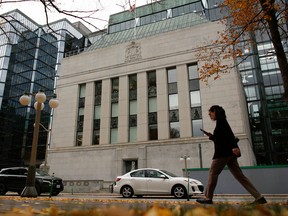The COVID-19 pandemic pushed Canada’s economy to the brink and recovery is only just beginning
Article content
Canadian businesses over the past 18 months have been piling on debt and relying on rent and wage subsidies to keep the lights on through punishing lockdowns to curb the spread of COVID-19.
Advertisement
This advertisement has not loaded yet, but your article continues below.
Article content
With a tentative recovery underway, business groups say the top priority of the new government to be elected Monday needs to be stoking the economy with policies that stimulate job creation, reduce skills gaps and encourage innovation, as well as maintaining existing subsidies for the hardest-hit sectors.
But business leaders also want a seat at the table so that the government and companies can work together to address problems that were slowing economic growth even before the pandemic, such as overhauling the tax system and ensuring that any policy changes do not penalize success.
“Regardless of which party wins this election, businesses want to see collaboration from leaders and a focus on economic growth,” said Rocco Rossi, chief executive of the Ontario Chamber of Commerce. “The business community can play an important leadership role in making sure Canada has a viable economic plan to recover its damaged and transformed economy.”
Advertisement
This advertisement has not loaded yet, but your article continues below.
Article content
Rossi and others who speak for business suggest their involvement will bolster corporate revenues and, therefore, government coffers without having to introduce higher taxes, which would be detrimental in the long term.
“Finding alternatives to taxes is no easy task, but (doing so) will limit the financial distress faced by households and businesses as we enter a period of economic recovery,” he said. “We will need to encourage investment and business activities that create jobs and generate the revenue needed to offset the extraordinarily high levels of public spending during the emergency.”
Sustained growth driven by private-sector investment would eventually replace the government stimulus measures that were taken at the start of the crisis and continue to this day, he said.
Advertisement
This advertisement has not loaded yet, but your article continues below.
Article content
But those supports shouldn’t disappear overnight, especially for the travel, tourism and restaurant industries, as well as other hard-hit sectors, said Perrin Beatty, a former member of Parliament and cabinet minister who is now chief executive of the Canadian Chamber of Commerce.
We can’t afford to have people, having brought them this far, drowning 50 feet from shore
Perrin Beatty
“We need, in the short term, to continue to provide assistance to businesses that are struggling in particular, particularly SMEs (small and medium-sized enterprises) and businesses in sectors like travel and tourism, which are particularly hard hit and which will take longer to come back,” he said.
An assessment of the major political party platforms by the Canadian Federation of Independent Business this week suggested that small businesses are concerned about plans to phase out or not renew wage and rent supports.
Advertisement
This advertisement has not loaded yet, but your article continues below.
Article content
“We can’t afford to have people, having brought them this far, drowning 50 feet from shore,” Beatty said. “We need to get them safely there, so there has to be targeted, continuing supports.”
At the same time, he said, whoever takes power should move quickly to match the commitments coming from other countries that are aiming to emerge from the pandemic as magnets for investment.
“We could be a magnet for talent, and for investment in the world, but we haven’t been sufficiently bold,” Beatty said, adding that the shortcomings in this area predate the pandemic.
For example, he said, Canada’s immigration system is “infinitely preferable” to that of the United States, but hasn’t been taken advantage of yet.
“We should be going out to companies and saying, ‘If you will locate an R&D facility anywhere in Canada, we’ll make sure that there’s either a Canadian or landed immigrant able to fill that job’ — by having a skills strategy that includes immigration.”
Advertisement
This advertisement has not loaded yet, but your article continues below.
Article content
Canada hasn’t turned a blind eye to the economic importance of bringing in talent, but Beatty said immigration levels are “miles away” from where they need to be to close the skills gap, particularly for high-tech jobs.
I fear our economic woes are not going to be the virus, but people
Perrin Beatty
All kinds of businesses — from those seeking highly-skilled workers to those looking for hourly service industry employees — are concerned about labour shortages, with one company even telling its local chamber of commerce that it was unable to hire burger flippers despite offering $20 an hour.
“I fear our economic woes are not going to be the virus, but people,” Beatty said.
A C.D. Howe Institute report this week suggested that new investment per available worker in Canada was half that in the U.S. during the second quarter of 2021. The report also said Canada compared poorly in projections of investment per worker through 2022 against other countries in the Organisation for Economic Co-operation and Development.
Advertisement
This advertisement has not loaded yet, but your article continues below.
Article content
“Since 2015, Canada’s stocks of capital per worker have been stagnant or declining and its rates of gross investment per worker have been weak,” the authors of the report said. “Moreover, business investment has been feeble compared to investment in the U.S. and other countries, a contrast that appears to have worsened during COVID-19.”
In addition to focusing on workforce and investment issues, business leaders say the next government must focus on reducing obstacles to innovation, including breaking down regulatory barriers to interprovincial trade, justifying the cost of any new regulations and overhauling the tax system.
Beatty noted that none of the party leaders aiming to be the next prime minister were born the last time there was a comprehensive reform of the tax system, which was kicked off by the Carter Royal Commission in 1962.
“What you’ve had is consistent tinkering with each new government coming in, putting in new taxes. And we’ve heard in the election about a tax on banks, or we hear about boutique tax cuts,” he said. “It just becomes more complex all the time and complexity, by its nature, is unfair.”
Both Beatty and Rossi said simplifying the tax system to make it efficient, competitive and fair would give companies the necessary time and incentive to focus on growth and innovation.
Advertisement
This advertisement has not loaded yet, but your article continues below.
Article content
We can’t go back … to where we were pre-COVID. Our performance was anemic
Perrin Beatty
The pandemic has already demonstrated that businesses are capable of a “burst of innovation” if given the right setting and incentives, Beatty said, as they did when stepping in to fill shortages of personal protective equipment and pivoting to online operations.
“We can’t go back … to where we were pre-COVID. Our performance was anemic,” he said. “We were falling behind our competitors in terms of investment and in terms of growth, notwithstanding the fact that even in those days, the federal government was running consistent deficits and with record low interest rates.”
Trevin Stratton, national economic advisory leader at Deloitte Canada, said the consultancy’s modelling shows that growth policies, including those that improve business investment levels, invest in infrastructure and enhance productivity, could push annual economic expansion to 2.7 per cent by the end of the decade, compared to 1.7 per cent before the pandemic.
“We are still expecting a significant economic rebound going forward, but we should be careful not to confuse an initial rebound with longer-term economic recovery,” he said. “A rebound will help to kickstart our economy, and Canadian businesses are looking for a plan that will help turn this into longer-term growth and job creation.”
Stratton noted that an aging population, poor productivity growth, slowing labour force growth, low investment and insufficient innovation were diminishing Canada’s growth prospects before the pandemic.
“To get our economy out of neutral, we need to address long-standing issues limiting our … growth,” he said. “If GDP grows slowly, so do incomes, profits and government revenues.”
Such long-term initiatives — as well as the stability and predictability businesses crave — may be in short supply, given the predictions that the Liberal minority government of the past two years will be replaced by another minority government next week. If this is the case, companies may begin pushing even harder to be key players in the recovery process, rather than just be tax piggy banks.
Advertisement
This advertisement has not loaded yet, but your article continues below.
Article content

Inflation surges at fastest pace in two decades in a hot streak that complicates recovery

Forget Asia — businesses that dare to venture into Africa are poised to reap the rewards

Tiff Macklem charts Bank of Canada’s path out of pandemic stimulus
Goldy Hyder, chief executive of the Business Council of Canada, said other countries have already set the bar by developing post-pandemic road maps that leverage private and public-sector partnerships.
“We hope Canada’s next government — and, indeed, all parliamentarians — will see the value in collaborating with the business community to ensure a resilient economic recovery,” he said.
Collaboration will also be key to avoiding the unthinkable for COVID-battered business: another lockdown as provinces battle the fourth wave of infections.
“We can’t afford to go back into lockdown,” said Beatty, adding that businesses are counting on governments to coordinate a national vaccination certification program by making it clear that it’s in the public interest.
“We need to have governments accepting their responsibilities there and not leaving business hanging out as the bad guy, as a piñata for everyone to take a whack at,” he said. “They have to set the regulations and it is the government’s responsibility as opposed to individual businesses.”
Financial Post
• Email: bshecter@nationalpost.com | Twitter: BatPost
Advertisement
This advertisement has not loaded yet, but your article continues below.
What businesses want: To be partners in the recovery no matter who wins the election
2021-09-17 20:29:16





